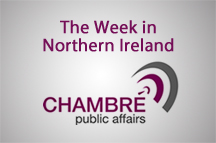.jpg) Since the Prime Minister announced a snap General Election on the steps of Downing Street on 18 April, commentators in Northern Ireland have focused almost exclusively on one thing: electoral pacts.
Since the Prime Minister announced a snap General Election on the steps of Downing Street on 18 April, commentators in Northern Ireland have focused almost exclusively on one thing: electoral pacts.
Indeed, the PM had barely left the podium outside Number 10 when Sir Jeffery Donaldson, DUP MP for Lagan Valley, was talking about collaboration with the Ulster Unionists. As his party leader, Arlene Foster, would later write, the DUP wanted to work with “other like-minded parties… to maximise Unionist representation at Westminster”.
A unionist pact brought some notable victories during the 2015 General Election. Ulster Unionist Tom Elliot became the first unionist MP in Fermanagh and South Tyrone for nearly two decades; and the DUP’s Gavin Robinson increased his party’s vote by over 16% to beat the Alliance Party in East Belfast.
At the start of this week, it looked like we were heading toward a similar arrangement for June’s contest. New UUP Leader Robin Swann announced that his party wouldn’t stand candidates in three constituencies – including North Belfast, where DUP Deputy Leader Nigel Dodds is seeking re-election. The DUP also confirmed that they will give Tom Elliot a free run in Fermanagh and South Tyrone.
However, no agreement has been reached on standing unionist unity candidates in other constituencies.
Some pundits believe a successful pact could return up to 11 unionist MPs out of a total of 18 Westminster seats in Northern Ireland. That looks less achievable now, but even if the unionist parties could form an electoral alliance, their influence in the Commons is still likely to be depleted.
With a working majority of just 17, the DUP’s eight MPs have provided a useful buffer for Theresa May in the Commons. However, if the Conservatives win a large majority in June, as polls predict, the DUP’s support simply won’t carry the same weight.
What impact will this have on the question of Northern Ireland and Brexit? DUP MPs believe that Northern Ireland is high on the Government’s list of priorities, as it prepares for the EU divorce. Will this remain the case if the Conservatives win a huge majority and, consequentially, don’t need to worry about keeping the DUP on side?
Elsewhere, the SDLP, Sinn Féin and the Green Party have held talks of their own – discussing the possibility of an anti-Brexit electoral alliance. In England, the Lib Dems and Greens seem to be moving in this direction, but locally, party politics has scuppered a deal.
The Greens pulled out first, arguing that they couldn’t work with Sinn Féin if its MPs continued their policy of abstentionism from Westminster. The party were also unwilling to support SDLP incumbent Alasdair McDonnell in South Belfast.
Things quickly unravelled thereafter, and a proposal from the SDLP to co-operate in three constituencies was rejected by Sinn Féin.
The centrist Alliance Party has accused the nationalist parties of sectarianising the election, using opposition to Brexit as cover for a ‘Green vs Orange’ agenda. Arguably, this is evidenced by the fact that Sylvia Hermon, the incumbent independent Unionist MP for North Down, was excluded from the negotiations. Lady Hermon is pro-EU and voted against the triggering of Article 50 in the Commons. It begs the question: why was she left out of the discussions?
Beyond the talk of pacts, the wider problem facing Northern Ireland is that the election campaign is likely further polarise politics here as efforts are made to restore power-sharing. To get the Assembly back up and running post-June, we’ll need a pact of a very different variety.














